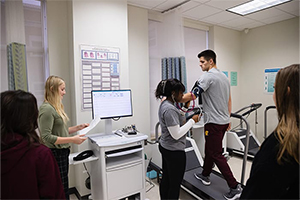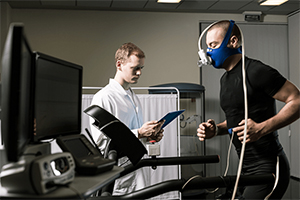What can you do with an exercise science degree?
Have you ever wondered if you can turn your passion for health and fitness into a career? If you're intrigued by science of movement and the complex functions of the human body, pursing a degree in exercise science could be the key to your perfect career.
 Exercise science careers include roles such as personal training, physical therapy and sports medicine. Students pursuing this major delve into subjects like anatomy, physiology and kinesiology. To thrive in this field, a solid educational background and skills in health and fitness are essential.
Exercise science careers include roles such as personal training, physical therapy and sports medicine. Students pursuing this major delve into subjects like anatomy, physiology and kinesiology. To thrive in this field, a solid educational background and skills in health and fitness are essential.
Explore the field of exercise science with a degree from Central Michigan University.
An exercise science degree opens the door to a variety of rewarding career opportunities in fitness, athletics and health-related fields. Let’s explore the diverse careers that leverage the knowledge gained from studying exercise science, helping you understand the exciting possibilities that await you.
What is exercise science?
First thing's first: let's get an overview of the field of exercise science. This branch of health science explores how physical activity impacts the human body. By blending insights from biology, physiology, biomechanics and nutrition, it aims to optimize health and performance. This field offers valuable guidance on enhancing physical well-being by applying a deep understanding of the mechanical and physiological responses the human body has to exercise. The goal of many professionals in this field is as much therapeutic as it is educational, so people can easily grasp how to improve their health through informed exercise practices.
Difference between kinesiology, athletic training and exercise science
Exercise science encompasses a wide range of topics, but it's important to differentiate it from related fields like kinesiology and athletic training:
- Kinesiology is the scientific study of human movement. It examines the mechanics and anatomy behind movement and lays a solid foundation for careers in rehabilitation, sports medicine and wellness coaching.
- Athletic Training is centered on the prevention, diagnosis and treatment of sports-related injuries. By blending exercise science with healthcare principles, it prepares professionals for rewarding careers as certified athletic trainers.
- Exercise Science is focuses on the mechanics of physical activity and its impact on health. It provides a comprehensive understanding of exercise's role in preventing disease, promoting wellness and enhancing athletic performance.
To put in plainly, kinesiology studies how a person moves, athletic training helps treat a movement-related injury and exercise science studies how movement can improve overall health. Understanding these distinctions can help you navigate your path in the world of exercise and health!
Careers in exercise science
An exercise science degree opens up a variety of rewarding career opportunities, including:
- Physical therapist - Support patients in their recovery from injuries or surgeries by developing customized exercise plans. A physical therapist's daily activities include assessing mobility, creating personalized treatment plans, guiding exercises and providing education on injury prevention and rehabilitation techniques. The median salary of a physical therapist is $99,710 per year.
- Occupational therapist - Work with patients of all ages who have physical, developmental, social or emotional challenges to improve their quality of life and ability to perform everyday activities. Occupational therapists assess needs, create customized treatment plans and guide patients through exercises that enhance independence. The media salary of an occupational therapist is $96,370 per year.
- Strength and conditioning coach - Design and implement effective strength training and conditioning programs specifically for athletes. A strength and conditioning coach typically designs training programs, leads workouts, assesses performance and provides nutrition advice to enhance overall fitness and athletic performance. The National Strength and Conditioning Association reports that average salaries for this career range for a conditioning coach is $60,527 to $84,575.
- Athletic trainer - Athletic trainers collaborate with athletes to prevent, diagnose and treat sports-related injuries. They assess injuries, develop rehabilitation programs and provide guidance on injury prevention, all while working closely with athletes and coaches to optimize performance. The median salary of an athletic trainer is $57,930 per year.
- Recreational therapist - Plan, direct and coordinate recreation-based medical treatment programs for individuals with disabilities, injuries or illnesses to provide effective and engaging support for recovery and enhanced quality of life. Recreational therapists design and implement therapeutic activities that improve clients' physical, emotional and social well-being. They lead group exercises, organize recreational outings, and facilitate adaptive sports to promote healing and enjoyment. The median salary of a recreational therapist is $57,120 per year.
- Exercise physiologist - Create tailored exercise programs for individuals with chronic illnesses to enhance their overall health. An exercise physiologist assesses fitness levels, designs personalized programs and monitors progress to improve health and performance. The median salary of an exercise physiologist is $54,860 per year.
- Fitness trainers and instructors - Work in facilities like recreation centers, health clubs, and yoga studios to lead, instruct and inspire individuals or groups in their exercise activities. Fitness instructors conduct engaging workout sessions, design personalized fitness plans and motivate clients to achieve their health goals while maintaining a healthy lifestyle. The median salary of a fitness trainer/instructor is $46,480 per year.
The demand for professionals trained in exercise science continues to grow with increased attention towards preventing chronic diseases and promoting overall health. According to data from U.S. Bureau of Labor Statistics, employment as an exercise physiologist is expected to grow 10% from 2023-2033, faster than the average for all occupations.
What will you learn in an exercise science major?
As an exercise science major, you’ll delve into a variety of topics that cover both basic and clinical sciences. This foundational knowledge equips you to understand human anatomy, physiology and movement effectively. You’ll learn to analyze research related to nutrition and health, conduct fitness assessments and develop tailored exercise programs.
 This degree provides you with expertise in biomechanics and exercise prescription, emphasizing the integration of physiological principles—skills essential for careers in physical therapy and rehabilitation. Ultimately, you’ll gain the ability to evaluate movement, promote physical fitness and enhance clients' overall health while also addressing exercise-related injuries and the role of nutrition in well-being.
This degree provides you with expertise in biomechanics and exercise prescription, emphasizing the integration of physiological principles—skills essential for careers in physical therapy and rehabilitation. Ultimately, you’ll gain the ability to evaluate movement, promote physical fitness and enhance clients' overall health while also addressing exercise-related injuries and the role of nutrition in well-being.
There are many exciting opportunities for graduate studies in exercise science! Advanced education options include Health Coach Certifications and master's degrees in kinesiology, athletic training or exercise physiology. If your goal is to pursue a doctoral degree, such as a Doctor of Occupational Therapy or a Doctor of Physical Therapy, starting with an undergraduate major in exercise science is an excellent way to set yourself on that path.
Choosing an exercise science program
Choosing the right exercise science program is key to receiving a quality education and gaining relevant experience that will help you stand out in a competitive market. While it helps to know your intended career, it's okay if you haven't figured things out that far ahead. Plenty of hands-on work and experience-based learning is a good indication of a quality program.
 Here are some important factors to keep in mind:
Here are some important factors to keep in mind:
- Accreditation - Make sure the program is accredited by a recognized body, such as the Commission on Accreditation of Allied Health Education Programs (CAAHEP).
- Specializations and pathways - Look for programs that allow you to specialize in areas that match your career aspirations, whether that's clinical exercise science or sports management. You'll also want to consider pre-professional pathways that will build up your application to graduate school later on.
- Hands-on experience - Seek out programs that offer practical experience through internships, research opportunities and access to state-of-the-art facilities.
- Faculty expertise - Investigate the faculty’s backgrounds to ensure you’ll be learning from seasoned professionals actively engaged in the field.
- Career support - Check that the program provides strong career counseling and networking opportunities to help you transition smoothly into the workforce.
By considering these factors, you can confidently choose a program that aligns with your goals and sets you up for success.
Exercise science at CMU
CMU offers pre-health pathways to guide you toward graduate health schools. Choosing an undergraduate major is crucial on your pre-health journey. Our exercise science major is a popular option for students pursuing pre-medicine, pre-physical therapy, pre-physician assistant, or pre-occupational therapy paths. We're here to support you every step of the way!
To give you a clear overview of some excellent programs at Central Michigan University, here are a few highlights:
- Exercise Science Major: This program offers a strong foundation in exercise science, complemented by hands-on experience. Students have the opportunity to specialize in areas like clinical exercise science, health fitness and kinesiology. Additionally, you can achieve first aid and CPR certification through the American Red Cross.
- Exercise Physiology MS: Our master's program offers an in-depth understanding of how the human body responds to exercise, with great opportunities for research and teaching assistantships.
- Athletic Training Programs: This program offers a combined bachelor’s and master’s degree path, concentrating on athletic training, sports medicine and injury prevention.
These programs are designed to equip you with the knowledge and skills needed to excel in the field!
Summary
The curriculum for an exercise science major typically includes courses in anatomy, physiology, biomechanics and nutrition. At Central Michigan University (CMU), for example, students gain hands-on experience through laboratory activities and internships (source). CMU's program offers specializations in clinical exercise science, health fitness and kinesiology, preparing students for diverse career paths or further education in fields like physical therapy or medicine.
Pursuing a career with an exercise science degree opens the door to rewarding roles that positively influence individuals' health and well-being. As you explore your options, think about the areas that inspire you the most and look for programs that provide the necessary education and experience to thrive in this field. Whether your goal is to become an exercise physiologist or to delve into wellness management, there are numerous opportunities to make a meaningful impact in this expanding industry.
Pursuing a degree in exercise science opens up numerous career opportunities to improve health and well-being. This exciting field includes roles like exercise physiologist or wellness manager, allowing you to make a positive impact.
Sources
- United States Bureau of Labor Statistics, Occupational Handbook
- Commission on Accreditation of Allied Health Education Programs, Find an Accredited Program
- National Strength and Conditioning Association, Strength and Conditioning Coach Salary